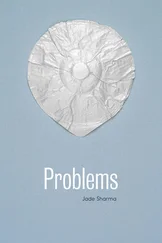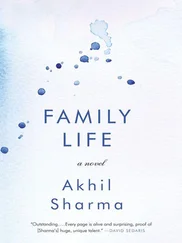"God!" Pitaji bays.
The fan whirrs. The tube light keeps the dark dammed out of the common room. At times Pitaji's cries drop, becoming moans.
The doorbell rings. I go to answer it. It is the woman from next door, a widow with such a square face she looks almost like a man.
"Pitaji ate onions with yogurt and got a stomachache," I say. Asha is with me.
"When he had his heart attack, my boys kicked open your front door." She is smiling, as i{ this was an adventure, and then, almost with regret, says, "This time we won't have to." She leaves.
The cries stop an hour or so before dawn. But Pitaji does not appear that morning. Late in the afternoon, when I have begun thinking I should check to see if he is alive, Pitaji enters my bedroom. I am sitting in bed reading the newspaper. He is wearing only his underpants. His stomach pushes their top down.
"I'm not dead," he says quietly. He comes and stands close to me.
I remain silent, because I do not know how he will react to anything I do.
"I cannot die, serpent."
Then he goes back to his room and lies on his cot. He does not close the door. I am too frightened to do so. I stay in the living room. When Asha descends from the roof into the common room a little later, Pitaji calls out to her, "Your mother is murdering me. She throws away my medicine and is feeding me so much I have had another heart attack." I come into the common room. Asha looks at him and then at me. It is strange to have everything described so clearly. Asha climbs back up the ladder. "Murderess," Pitaji tries shouting, but his voice is no louder than a normal person speaking. He falls asleep and I lock his door.
When he wakes, he shakes the door instead of knocking on it as he normally does when he wants to be let out. I bolt him in when he goes back to sleep.
The thing that made him scream also leaves him without energy. Most days he remains on his cot. But he no longer lets me lock the door. As soon as he finds out he is locked in, he begins shaking the door.
One afternoon he comes into my room. I am sitting on a chair lengthening Asha's school skirt. "I don't want to see your unlucky
face," he says. His voice is buried and far away. "Keep the door closed. But I am no animal to be locked in."
At first I am half relieved, because it suggests Pitaji will stop me eventually. But he does not go to buy his medicines and he continues to eat the ridiculously rich food I make. I put butter even in his yogurt.
The new compromise works for a while.
I want to celebrate Asha's birthday quietly. I do not know what Pitaji might do if he finds out. I make halva for her before she goes to school. I pray with her in our room.
Asha takes the bowl of halva I have given her to Pitaji's door. "Nanaji, it's my birthday. Do you want some halva?" I am in the kitchen.
Pitaji opens his door. Asha holds the bowl forward with both hands. He looks surprised and then angry. Pitaji takes the bowl and turns it upside down in front of Asha. The spoon in it clinks on the floor.
Pitaji stops lying on his cot except at night. He wanders the flat. Periodically he grabs folds of his stomach, shakes it at us, and speaks in a falsetto, as if it is his stomach talking. "After he dies, will I keep living?" I refuse to answer him when he is in such moods. In front of Asha he has his stomach say, "It's his penis that made problems, not me. Why should I die, too?" Mostly Pitaji makes pronouncements and does not attempt conversations.
Pitaji tries to enter every part of our lives. He plays cards against himself on our bed. He sits beside us during meals and sometimes in the middle of them starts spooning subji from our bowls and breaking off pieces of our rotis. I can't touch my food after he's touched it. He treats Asha the same way he treats me. I ignore him, and Asha begins to follow my example.
Pitaji sometimes comes into our room in the middle of the night and turns on the light and sits at the foot of the bed without saying anything. Sometimes his anguish stirs my own and I wish to comfort him. In these moments I look away.
But one day I notice Pitaji's ankles are dirty. Then I understand
that patches of his skin have turned black from the absence of blood. I start to cry. When unhappiness is so great, how can one separate mine and yours?
Pitaji looks down at his ankles and murmurs, "My life."
There is a period when Pitaji takes to leaving the flat. He goes down the gallery to the flat next to ours and tells the widow who lives there and her two sons that I am killing him for money I believe he has.
The widow tells me this. "If we had money, wouldn't we spend some?" I tell her. I am afraid of being robbed and murdered if rumors of wealth spread.
Then Pitaji goes down into the compound and tells them what he has done to me but claims that these are all lies. I learn from the widow that he cries as he tells the story. Then he always tells his audience that he is being slowly poisoned for money.
I do not care that he is telling them what happened or claiming that this was a lie. But I worry about crime. One evening, when he is wandering around the compound with his story, I go down and shout, "Senile fool, leave these people in peace." Then I address the two old women he had been talking to: "Come upstairs. Look in my home and see what we have that's worth stealing." They follow eagerly while Pitaji stays downstairs. I show them how dull my knives are. I point out that I've been thinking of buying a deodorant for the latrine but don't want to get caught up in unnecessary expenses.
One day Pitaji comes into my room and announces, "I am taking the flat back." He is wearing pants and shoes. Going down the gallery, he moves with his feet splayed out and carefully, as if he is afraid to slip. I wonder how the clouds and blue sky look to him.
When he returns from his lawyer, he again lies down on his cot.
It is the last time he leaves the flat.
Once, I find Asha standing beside Pitaji's cot.
"Come here," I demand, and she does. Pitaji looks at the ceiling.
His face is wet as it almost always is. "What were you talking about?"
"I asked why he cries all the time."
Asha looks at me. She has the face of someone so much older that I am afraid. "What did he say?"
"He said he doesn't want to die."
TWELVE
K
usum worried as she watched the low white buildings of Indira Gandhi International Airport drift by the window. The flight had been delayed in London, and it was early morning. To Kusum the slow confusion of the trucks and vans guiding the plane seemed the result of fatigue. Ben, Kusum's husband, was asleep in the aisle seat, and their six-year-old daughter, Carolyn, her bare feet hovering midway between seat and floor, lay dozing in the center. Kusum and her family had arrived in Delhi to meet Asha and decide whether or not to adopt her.
Waiting in line to go through customs, Kusum slipped two fingers through a belt loop of Ben's jeans, and he, automatically, caressed the back of her neck. Several times since Pitaji died they had discussed taking in Asha. Because all the neighborhood knew of Pitaji's rape of Anita, Asha was considered naturally inclined
toward depravity. Grown men sometimes surprised her when she was walking alone and shoved her into walls and then pressed themselves against her. Now that Asha was fourteen and developing breasts, the molestations were more frequent and violent. Also, she was nearing the age when the U.S. government would make immigration difficult. "I won't let Anita force us into anything," Kusum said, looking up at Ben. She released Carolyn's hand and put both arms around her husband's waist. Ben was slender, with thinning curly hair. Beneath the airplane odor on his shirt, she found his smell of clean laundry and apples and wondered why she was so distrustful of people.
Читать дальше












